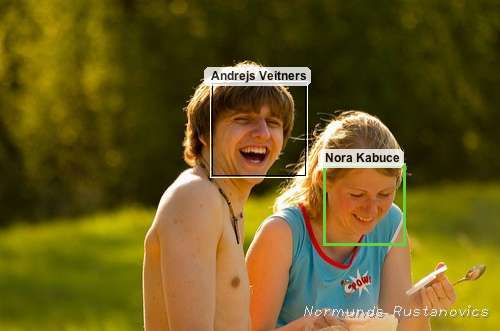Troy expressed both great amusement and trepidation in his message alerting me to Riya, a new photo sharing site:
I don’t know whether to say cool, or zool.
The tour explains that you upload photos, Riya identifies faces in your photos, then asks you to name them (or correct its guesses!). Then you get all your friends to join up and we can all search for everybody by people, location, and time. So say “hi” to Andrejs and Nora in Normunds‘ photo, above.
So the good news is that there’s a chance that you’ll be able to use this to reconnect with that interesting someone you hooked up with the other night, but the mixed news is he or she may be able to find you — not so great if you instead hoped to disappear anonymously.
And all of this connects to my old chorus: identity is reputation. It’s too early for me to judge how this will effect our lives — well, my life anyway — but 2006 is now the year that facial recognition emerged from the dark halls of law enforcement and counter-terrorism and started greeting us on the street.
That foolish face you made in the background of some unknown tourists photo might be tracked. But is that really so bad? Sure, it might lead to embarrassing explanations, but it might also lead to new connections. Stealing the words of a friend, we seem to enjoy gossamer stories of lives barely touching, and maybe we’ll appreciate the opportunity to occasionally find or be found by the anonymous people who fill the blurry edges of our pictures.
I’m betting we’ll become aware of our social identities, our electronically tracked reputations, and we’ll start to act with some greater consciousness of them. Many bloggers are already familiar with this, sometimes painfully. Our notions of privacy and anonymity will certainly change, but we’re unlikely to be able to stuff this genie back in the bottle. And I’m not yet sure we’ll want to.
